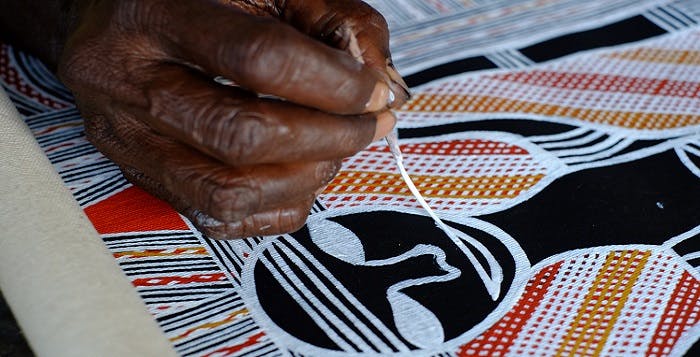Gayili Marika Yunupingu Gumatj Clan Elder of the Galupa Community Yolgnu Nation, North East Arnhem Land, Northern Territory, Australia
For Aboriginal and Torres Strait Islander people, Australia’s colonial history is characterised by devastating land dispossession, violence and racism. Over the last half-century, however, many significant steps towards reconciliation have been taken.
HCLTech has established a Reflect Reconciliation Action Plan (RAP) to amplify the organization's commitment to reconciliation with Aboriginal and Torres Strait Islander people. The work has already begun towards the second tier: an Innovate RAP for 2023-2024.
Aboriginal and Torres Strait Islander People have long called for a comprehensive truth-telling process about Australia’s history, which is central to the reconciliation process. Telling the truth about Aboriginal and Torres Strait Islander people’s history brings to light colonial conflict and dispossession and acknowledges the strength and resilience of Aboriginal and Torres Strait Islander people and cultures. Truth-telling has been central to reconciliation since the Council for Aboriginal Reconciliation began its work 30 years ago.
A First Nations Voice to Parliament protected by the Constitution is a key element of the Uluru Statement from the Heart. For 122 years, Australia’s founding document has failed to recognize Aboriginal and Torres Strait Islander people and their more than 65,000 years of continuous connection to the vast land. There is growing momentum and attention leading up to the 2023 Referendum. Recognizing Aboriginal and Torres Strait Islander Australians in the Constitution is Australia's best chance to address past injustices and move Australia forward for everyone. The United Nations Association of Australia (UNAA) urges political parties to accept the Uluru Statement from the Heart and work towards truth, justice and forgiveness.
Reconciliation Australia’s vision of reconciliation is based and measured on five dimensions: historical acceptance; race relations; equality and equity; institutional integrity and unity.
Commenting on Reconciliation, Lara Higson, Vice President, Strategic Programs, Co-chair of RAP Working Group (RWG) at HCLTech, says: “We need to go beyond symbolic gestures of apology. We must participate in progressing self-determination for Aboriginal and Torres Strait Islander peoples.”
Based on the core pillars of relationships, respect and opportunities, Reconciliation Action Plans (RAPs) help organizations take meaningful action to advance reconciliation with their staff to provide tangible benefits for Aboriginal and Torres Strait Islander people. The Council for Aboriginal Reconciliation states that the actions created by RAPs are a positive pathway towards “a united Australia which respects this land of ours, values the Aboriginal and Torres Strait Islander heritage and provides justice and equity for all”.

Reconciliation—an ongoing journey
The 2022 Australian Reconciliation Barometer found there is far greater awareness, trust and understanding of the complexity and magnitude of Aboriginal and Torres Strait Islander people and their communities. The survey shows nearly all Australians want Aboriginal and Torres Strait Islander people to have a say in their affairs—with a significant increase in support for a treaty.
This year’s theme for National Reconciliation Week 2023—Be a Voice for Generations—sends a clear message that Australians need to recognize their contribution to a unified Australia through positive actions. Throughout the calendar year, there are many ways to celebrate and become active citizens working together with Aboriginal and Torres Strait Islander communities and their families.
Reconciliation in heart, mind and action
A 2020 survey of Aboriginal and Torres Strait Islander workers found 78% of respondents felt it important to identify as an Aboriginal and Torres Strait Islander person at work, while 63% reported high levels of identity strain and “high cultural load” in meeting expectations of the dominant culture in the workplace.
Unsafe workplace environments, discrimination over someone’s cultural identity and workload stress are hazards that increase the risks of inducing vicarious traumas. Communities, organizations and employers are responsible for creating a harmonious, culturally safe workspace, for being inclusive of empowering creativity, identity and a sense of belonging.
HCLTech has been working towards cultural sensitivity across all spheres of the organization.
Commenting on the impact of RAPs, Jet Swain, Executive Design Director, Symplicit, Co-chairs RAP Working Group (RWG) at HCLTech says: “Many companies are intimidated by the concept of reconciliation; they have a fear of appearing as though they are value-signaling or opening themselves up to conflict, scrutiny, and controversy. To make the change, we’ve got to be brave enough to go past that conversation and take sustainable, strategic and meaningful action to advance reconciliation.”
The most meaningful action is an extension of HCLTech’s business. The mission is to work and partner with Aboriginal and Torres Strait Islander people to boost employee, client and supplier diversity. In return, HCLTech increases its capability through the self-determination of Aboriginal and Torres Strait Islander people and their communities via investment, training and employment.
While National Reconciliation Week every year urges people to walk united and look for opportunities in daily life to champion Aboriginal and Torres Strait Islander people and their communities, global technology companies like HCLTech are implementing their RAP to illustrate the organization’s commitment to reconciliation through decisive business actions.
HCLTech’s reconciliation actions aim to create a unified, strong foundation for Aboriginal and Torres Strait Islander people to self-determination pathways.
Reflect—Reconciliation Action Plan (RAP)
The RAP Working Group, in consultation with Cultural Liaison Consultant Irene Wardle, a proud Darug Woman, is a collaboration between HCLTech, DWS Group and Symplicit. The mission is to advance the priorities of Aboriginal and Torres Strait Islander people and their communities across Australia. The company is developing relationships with localized small to medium businesses and communities in every head office across Australia.
A major part of Irene’s role is supporting HCLTech in consultation with the Aboriginal Community and introducing and encouraging them to varied business opportunities and standards. As an established global entity, HCLTech has resources to support, grow and partner with Aboriginal and Torres Strait Islander businesses.

 Listen to article
Listen to article



